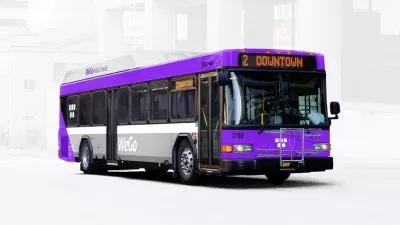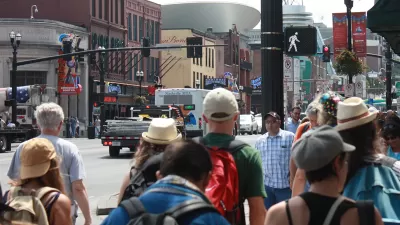The city of Nashville is trying to get back on track with some of the projects proposed in the 2016 nMotion plan—even without the massive pot of transit tax money it could have won at the ballot box.

"Metro officials hope an $18 million transit center will spark fresh activity in a part of town that has felt few ripples from Nashville's overall boom," reports Meg Garner in an article that might be blocked by a paywall for some readers.
Aaron Short provides additional, paywall-free coverage of the transit center plans, also providing background on the Let's Move Nashville transit funding referendum rejected by voters in May 2018. As noted by Short and Garner, the transit center is a part of the nMotion transit plan approved by Nashville region officials in 2016. In 2019, the transit center plans will rely on funding from the federal government.
Short describes the vision for the proposed transit center. "Once completed, the enclosed station would have up to four open-air bus bays with a climate-controlled passenger-waiting area, cyclist amenities and facilities conveying real-time locations of incoming buses, according to the MTA. Three bus routes now provide service through the location but the hub could provide connections for up to three more routes, including rapid bus services."
Short offers a lot more information on the political and planning context for the new proposal, as also recently provided by TransitCenter. Transit is tricky in Nashville—as more anecdotes than the failure of Let's Move Nashville prove. This past June, WeGo (née Nashville MTA) announced it would eliminate eight bus routes and raise fares from $1.70 to $2.

Trump Administration Could Effectively End Housing Voucher Program
Federal officials are eyeing major cuts to the Section 8 program that helps millions of low-income households pay rent.

Planetizen Federal Action Tracker
A weekly monitor of how Trump’s orders and actions are impacting planners and planning in America.

Ken Jennings Launches Transit Web Series
The Jeopardy champ wants you to ride public transit.

Crime Continues to Drop on Philly, San Francisco Transit Systems
SEPTA and BART both saw significant declines in violent crime in the first quarter of 2025.

How South LA Green Spaces Power Community Health and Hope
Green spaces like South L.A. Wetlands Park are helping South Los Angeles residents promote healthy lifestyles, build community, and advocate for improvements that reflect local needs in historically underserved neighborhoods.

Sacramento Plans ‘Quick-Build’ Road Safety Projects
The city wants to accelerate small-scale safety improvements that use low-cost equipment to make an impact at dangerous intersections.
Urban Design for Planners 1: Software Tools
This six-course series explores essential urban design concepts using open source software and equips planners with the tools they need to participate fully in the urban design process.
Planning for Universal Design
Learn the tools for implementing Universal Design in planning regulations.
Heyer Gruel & Associates PA
Ada County Highway District
Institute for Housing and Urban Development Studies (IHS)
City of Grandview
Harvard GSD Executive Education
Toledo-Lucas County Plan Commissions
Salt Lake City
NYU Wagner Graduate School of Public Service





























